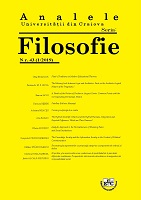THE MISSING LINK BETWEEN LOGIC AND AESTHETICS. KANT ON THE AESTHETIC-LOGICAL NATURE OF THE PRAGMATIC I
THE MISSING LINK BETWEEN LOGIC AND AESTHETICS. KANT ON THE AESTHETIC-LOGICAL NATURE OF THE PRAGMATIC I
Author(s): Fernando M. F. SilvaSubject(s): Logic, Aesthetics, Pragmatism
Published by: Editura Universitaria Craiova
Keywords: Kant; Anthropology; Aesthetics; Logic; pragmatic I;
Summary/Abstract: We know today Kant’s importance in founding modern Anthropology; we also know that Kant undertakes this by excising Anthropology from a metaphysical trunk, and that instead of inoculating it in another trunk, Kant rather singularly replants it in a different soil, through a different method, as its own self-sufficient trunk. Not so widely known, however, is the new position of this science. For, according to Kant, such a transplantation did not mean its isolation. Quite on the contrary, Anthropology is the ante-chamber of man’s self-knowledge, and this makes it not a dissociating, rather an agglutinating pole of the surrounding branches of knowledge. Now, among such branches, two singularly exemplify this process: one which seems detached from Anthropology – that of Logic – and one which is now part of the Anthropology, that of Aesthetics. There is, of course, a singular relation between these three fields of knowledge. And so our question is: what is the relation of Anthropology to logic (and hence, to the critique) and to aesthetics? What aspirations may Anthropology have in fulfilling one of Kant’s main designs: that of uniting such opposites and thereby claim the superior dignity of the science of man? And what role do these two domains have in the inception of Kant’s anthropological thought? The answer(s) to this, we believe, reside in Kant’s proposition of a new I and the I’s new pragmatic vision. Namely, Kant proposes an I in the world, an alternative, for dual, or plural form to the I’s egoism, one which at once seeks to satisfy the claims of Logic, by knowing itself and the world, and those of Aesthetics, by experiencing pleasure in its knowledge of itself and its species in the world. This pluralism, we hope to prove, is to be seen not only as a factor of necessary distinction, but also as a factor of possible union between that which separates Logic and Aesthetics: logical egoism and aesthetic egoism.
Journal: ANALELE UNIVERSITĂȚII DIN CRAIOVA. SERIA FILOSOFIE
- Issue Year: 1/2019
- Issue No: 43
- Page Range: 21-45
- Page Count: 25
- Language: English

